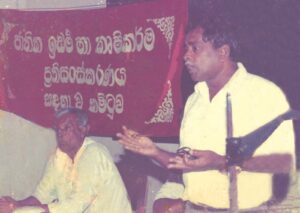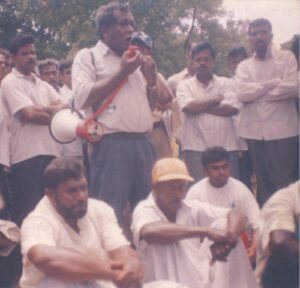History
MONLAR started with a dialogue. This dialogue was one where we tried to find answers to questions that were extremely serious. The youth uprising of 1988-90 had resulted in around 60,000 disappearances, (as estimated by the European Parliamentary Delegation that visited Sri Lanka in 1991) making Sri Lanka one of the most violent countries in the world. In this uprising around thirty of our activists connected with the All Lanka Peasant Congress were assassinated. They were killed for their support of the devolution of power to the Tamil people and not because they joined the insurrection.
 There were previous experiences of two uprisings, one in the South in 1971 and the other in the North beginning in 1976 which ended up in a long war for over 30 years. Why were these happening? What understandings did the responsible leaders of society have and what solutions did they have?
There were previous experiences of two uprisings, one in the South in 1971 and the other in the North beginning in 1976 which ended up in a long war for over 30 years. Why were these happening? What understandings did the responsible leaders of society have and what solutions did they have?
 A group of people who worked with the All Lanka Peasant Congress (ALPC) and the Peasant Information Centre (PIC), Ibbagamuwa, made a submission on this to the Presidential Commission on Youth in 1990, (Ref: Youth Uprisings and Social Responsibility) and decided that these questions needed to be discussed with people island-wide. A similar submission was made to the Presidential Task Force for Land Distribution and Utilization appointed by then President R. Premadasa.
A group of people who worked with the All Lanka Peasant Congress (ALPC) and the Peasant Information Centre (PIC), Ibbagamuwa, made a submission on this to the Presidential Commission on Youth in 1990, (Ref: Youth Uprisings and Social Responsibility) and decided that these questions needed to be discussed with people island-wide. A similar submission was made to the Presidential Task Force for Land Distribution and Utilization appointed by then President R. Premadasa.
It was necessary to analyze the reasons and discuss them widely with ordinary people in the country who had suffered, and were continuing to suffer, and therefore would want to find genuine solutions. From this time onwards MONLAR’s process was one of trying to analyze society, how our situations are linked and influenced by global trends and to develop responses to effectively influence the changes in the country in relation to such efforts globally. When people have the right analysis of problems they can create right solutions. This search and dialogue had to be made as wide as possible among people who suffered the consequences. We have continued this dialogue consistently over the last 25 years.
1984 –
Campaign against water tax and peasant struggle in Wellassa against mass land grabbing for sugar cultivation
1987 –
Formation of Peasant Information Centre
1989 –
Submission of the proposals for land reforms
1990 –
Formation of Committee for National Land and Agricultural Reforms
1992 –
Breaking civil laws against making the country a single economic zone
1993 –
Initiation of the Movement for National Land and Agricultural Reform
1993 –
Initiation of the National Movement Mother’s to Combat Malnutrition
1994 –
Signing the petition against WB
1994 –
Struggle to demand solutions for farmer suicides due to indebtedness
1996 –
Start of the Sandeshaya (The Message) news bulleting (Official publication of the movement)
1996 –
“Hour of Truth” campaign to awareness building of the people on international loan traps
1997 –
Initiation of the campaign to protect Eppawala Phosphate deposit
2000 –
Signing the petition of Jubilee 2000 to demand debt cancelation
2000 –
Polonnrauwa farmers hunger strike to demand better price for paddy
2001 –
Campaign against water privatization
2001 –
Campaign of the Peoples Movement to Reduce Milk Prices
2002 –
National Movement Against Highways
2003 –
Campaign series against the “Regaining Sri Lanka: Connecting to Growth” structural adjustment policies
2003 –
Formation of National Movement for the Protection of Human Rights and Natural Resources
2005 –
Formation of the People’s Planning Commission after the Tsunami disaster
2005 –
Campaign series against WTO
2006 –
Campaign against Norochcholai Coal Power Plants
2007 –
Public March to Protect Paddy Farmers
2007 –
Formation of National Movement of Milk Farmers
2007 –
Campaigns against the attempts of Sugar plantations in Bibile
2008 –
Initiation of public campaigns of the solutions for food sovereignty
2009 –
Campaign against the war
2009 –
Campaign against media suppression, forced disappearances and killings
2010 –
Initiation of the Panama land struggle
2012 –
Formation of People’s Planning Forums at Provincial level
2012 –
Initiation of the People’s Movement for the Plantation Communities’ Land Rights
2012 –
Initiation of collaborative programs with Department of Agriculture to promote ecological agriculture
2013-
Formation of the National Movement to Protect Seed Rights
2014 –
Initiation of the annual People’s Caravan for Food Sovereignty
2014 –
Collaborative action with “Street Protest” movement to defeat dictatorship regime
2015 –
Presenting the people’s proposals for agricultural reforms
ALL CONTACTS
- No. 57, 1st Lane, Meda Welikada Road, Rajagiriya, Sri Lanka.
- +94 112 870 369
- monlar@sltnet.lk
- www.monlar.lk
SUBSCRIBE
Subscribe us to get latest updates of Sri Lankan Peasant movement
Error: Contact form not found.
- Monlar - Copyright 2024
- donations@ong.com
- volunteers@ong.com
- contact@ong.com









